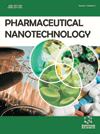
Full text loading...
Quercetin, a natural flavonoid, is well-proven for anticancer properties in a variety of cancers. Quercetin's anticancer action is driven by its anti-inflammatory and antioxidant properties. It inhibits pro-inflammatory cytokines (e.g., TNF-α, IL-6) and suppresses NF-κB and COX-2, reducing tumor growth. Its antioxidant activity neutralizes reactive oxygen species (ROS), preventing oxidative damage that can lead to cancer. However, quercetin faces challenges such as poor solubility, bioavailability, instability, low skin penetration, rapid metabolism, and potential systemic toxicity at high doses, which limit its therapeutic application. Nanocarrier systems such as liposomes, polymeric nanoparticles (PLGA-based), solid lipid nanoparticles (SLNs), and nanoemulsions have been developed to address these issues. These formulations enhance quercetin’s penetration, stability, and bioavailability, improving its effectiveness against skin cancers by promoting controlled release and targeted delivery. Nanocarriers offer a promising solution to overcome these limitations and enhance its anticancer potential.

Article metrics loading...

Full text loading...
References


Data & Media loading...

